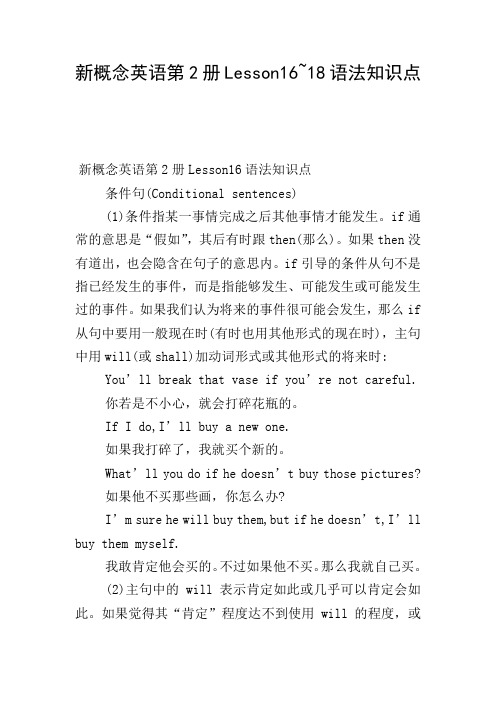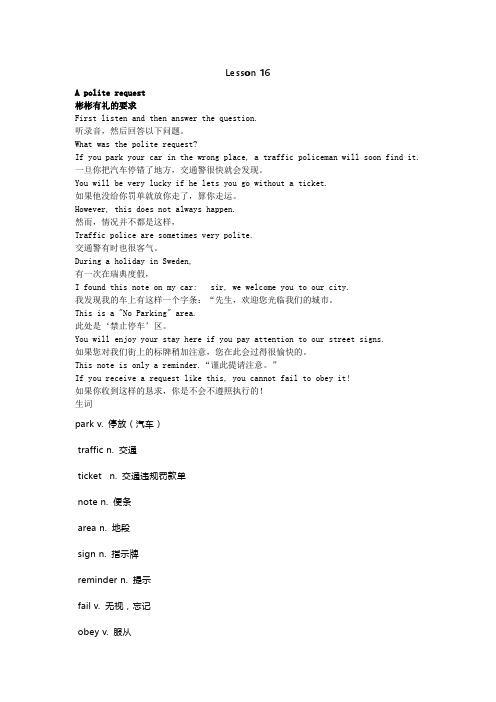新概念英语第二册课堂笔记第16课
新概念英语第2册Lesson16~18语法知识点

新概念英语第2册Lesson16~18语法知识点新概念英语第2册Lesson16语法知识点条件句(Conditional sentences)(1)条件指某一事情完成之后其他事情才能发生。
if通常的意思是“假如”,其后有时跟then(那么)。
如果then没有道出,也会隐含在句子的意思内。
if引导的条件从句不是指已经发生的事件,而是指能够发生、可能发生或可能发生过的事件。
如果我们认为将来的事件很可能会发生,那么if 从句中要用一般现在时(有时也用其他形式的现在时),主句中用will(或shall)加动词形式或其他形式的将来时: You’ll break that vase if you’re not careful.你若是不小心,就会打碎花瓶的。
If I do,I’ll buy a new one.如果我打碎了,我就买个新的。
What’ll you do if he doesn’t buy those pictures?如果他不买那些画,你怎么办?I’m sure he will buy them,but if he doesn’t,I’ll buy them myself.我敢肯定他会买的。
不过如果他不买。
那么我就自己买。
(2)主句中的will表示肯定如此或几乎可以肯定会如此。
如果觉得其“肯定”程度达不到使用will的程度,或者如果想表达建议等其他意思,就可以用别的情态助动词来代替will:Shall post these letters for you?我替你将这些信发了好吗?You can post them if you want to.如果你愿意,你可以把它们寄走。
If it’s fine tomorrow,we can/may go out.如果明天天气好,我们可以/可能出门去。
(3)主句还可以用祈使语气等表示请求、建议等:Stay at home tomorrow if it rains.明天如果下雨就呆在家里。
新概念英语第二册lesson16课堂笔记

Lesson 16A polite request彬彬有礼的要求First listen and then answer the question.听录音,然后回答以下问题。
What was the polite request?If you park your car in the wrong place, a traffic policeman will soon find it. 一旦你把汽车停错了地方,交通警很快就会发现。
You will be very lucky if he lets you go without a ticket.如果他没给你罚单就放你走了,算你走运。
However, this does not always happen.然而,情况并不都是这样,Traffic police are sometimes very polite.交通警有时也很客气。
During a holiday in Sweden,有一次在瑞典度假,I found this note on my car: sir, we welcome you to our city.我发现我的车上有这样一个字条:“先生,欢迎您光临我们的城市。
This is a "No Parking" area.此处是‘禁止停车’区。
You will enjoy your stay here if you pay attention to our street signs.如果您对我们街上的标牌稍加注意,您在此会过得很愉快的。
This note is o nly a reminder.“谨此提请注意。
”If you receive a request like this, you cannot fail to obey it!如果你收到这样的恳求,你是不会不遵照执行的!生词park v. 停放(汽车)traffic n. 交通ticket n. 交通违规罚款单note n. 便条area n. 地段sign n. 指示牌reminder n. 提示fail v. 无视,忘记obey v. 服从1.park v.停车n.公园parking lot / parking area停车场2.traffic n.交通traffic jam 交通堵塞traffic lights 红绿灯heavy traffic 拥挤的交通3.ticket n.交通罚款通知单, 违章通知单parking ticket 违法停车罚单speeding ticket 超速行驶罚单4.police n.警察,警方police形式上看起来是单数,但是表示复数含义(单形复义),是一个集体名词。
新概念英语第二册 Lesson 16

• • • •
• • • •
如果他来的话, 告诉我一声。 In case he comes, let me know. 我将把我的字典给你, 如果你明天要还的话。 I shall give you my dictionary on condition that you return it tomorrow. 只要我的费用有人付, 我就去。 I will go, providing/provided (that) my expenses are paid. 他要是不来, 我们该怎么办? Suppose/Supposing (that) he does not come, what shall we do?
pay attention to, care, take care of, look after
• • • • • • 请注意看黑板。 Please pay attention to the blackboard. 他就是折断颈骨,我也不在乎。 I don't care if he breaks his neck! 别担心花园,你度假的时候我会照顾它的。 Don't worry about the garden. I'll take care of / look after it while you are on holiday. • 我出去的时候请代我照看孩子。 • Please take care of / look after the children for me when i am out.
• If引导的真实条件从句中,从句往往为现在 时,主句中会用到一般将来时或者祈使句。 • 2. in case, on condition that, providing, provided (that), supposing, suppose (that)等词汇意思 相近, 指“假如, 假使, 在……条件下”( 比if更为书面化)。
新概念英语第2册:第16课重要句型语法

第16课的内容: ⼀、重要句型或语法 1、if条件句 在第⼀册第137-138课⾥已经学过了if引导的条件状语从句,当时侧重的是“主将从现”的原则的运⽤。
本课的if条件句在“从现”的基础上,⼜增加了从句使⽤其他时态的情况,如:现在进⾏时(If he is working, I won't disturb him.)。
此外,还出现了与情态动词连⽤的情况,如:He will come tomorrow if he can. ⼆、课⽂主要语⾔点 If you park your car in the wrong place, a traffic policeman will soon find it. 1)注意park(熄⽕停车)和stop(临时停车)的区别。
2)wrong,错误的。
与right相反。
3)注意交警的表达:traffic policeman。
4)句中的it指的是前半句中所说的“车⼦停错位置”。
You will be very lucky if he lets you go without a ticket. 1)let sb. go,放过某⼈。
2)ticket,罚款单。
However, this does not always happen. 这句话要注意联系前后⽂来理解,本句所说的这种情况(this)不常发⽣,指的是交警不总是很严厉。
本句话可以作为套话来⽤,表达某种情况不常发⽣时⽤。
Traffic police are sometimes very polite. 1)police是警察的总称,⽤作复数。
2)本句话就验证了前⼀句话暗含的意思,即交警有时也很客⽓。
During a holiday in Sweden, I found this note on my car: "Sir, we welcome you to our city. This is a 'No Parking' area. You will enjoy your stay here if you pay attention to our street signs. This note is only a reminder." 1)note,便条。
新概念英语第二册:第16课课文详解及语法解析

新概念英语第二册:第16课课文详解及语法解析课文详注 Further notes on the text1.If you park your car in the wrong place, a traffic policeman will soon find it.一旦你把汽车停错了地方,交通警很快就会发现。
(1)英语中指每个人/任何人的不定代词通常是one:One can never know what will happen tomorrow.一个人永远不会知道明天将会发生什么事。
(即大家都不知道)但在日常会话中,非正式的you则更为常用:If you make a journey around the world, you'll see many beauty spots.如果你进行一次环球旅行的话,你就会看到许多风景胜地。
(you为泛指) (2)句尾的it代指的是句子的整个if从句,即你把汽车停错了地方这件事。
2.You will be very lucky if he lets you go without a ticket.如果他没给你罚款单就放你走了,算你走运。
(1)let (sb.) go 有“放开”、“释放”、“使自由”、“让(某人)去”等含义:The man won't let go (of) my arm.那人抓住我的胳膊不放。
He is very angry now. He won't let you go easily.他现在非常生气。
他不会轻易放过你的。
(2)without a ticket 在这里指 without giving you a ticket。
3.However, this does not always happen.然而,情况并不都是这样。
this 代指上句话所说的情况,即交通警一般都会给你罚款单。
4.This is a 'No Parking' area.此处是“禁止停车”区。
逐句精讲新概念英语第二册第十六课 彬彬有礼的要求

逐句精讲新概念英语第二册:第十六课彬彬有礼的要求Lesson 16 A polite request课文内容:If you park your car in the wrong place, a traffic policeman will soon find it. You will be very lucky if he lets you go without a ticket. However, this does not always happen. Traffic police are sometimes very polite. During a holiday in Sweden, I found this note on my car: Sir, we welcome you to our city. This is a "No Parking" area. You will enjoy your stay here if you pay attention to ourstreet signs. This note is only a reminder.' If you receive a request like this, you cannot fail to obey it!本文语法:真实条件句语法归纳:真实条件句谈论或询问十分可能发生或实现的事情。
真实条件句的形式:从句多用一般现在时,主句多用一般将来时。
一般总结为:主将从现。
If I have enough money next month,I will present you a ring.如果下个月我有足够的钱,我将送给你一枚戒指。
If it rains tomorrow, we will cancel the meeting.如果明天下雨,我们将取消会议。
If someone interrupts the class, we will feel angry.如果有人打断我们上课,我们会感到生气。
新概念英语第二册第16课-A polite request

新概念英语第二册第16课:A polite requestLesson 16 A polite request彬彬有礼的要求First listen and then answer the question.听录音,然后回答以下问题。
What was the polite request?If you park your car in the wrong place, a traffic policeman will soon find it.一旦你把汽车停错了地方,交通警察很快就会发现You will be very lucky if he lets you go without a ticket. However, this does not always happen.如果他没给你罚单就放你走了,算你走运。
然而,情况并不都是这样Traffic police are sometimes very polite. During a holiday in Sweden,I found this note on my car:交通警察有时也很客气。
有一次在瑞典度假,我发现我的车上有这样一个字条:' Sir, we welcome you to our city. This is a "No Parking" area. You will enjoy your stay here if you pay attention to our street signs.This note is only a reminder.'“先生,欢迎您光临我们的城市。
此处是‘禁止停车’区。
如果您对我们街上的标牌稍加注意,您在此会过得很愉快的。
谨此提请注意。
”If you receive a request like this, you can-not fail to obey it!如果你收到这样的恳求,你是不会不遵照执行的!New words and expressions 生词和短语parkv. 停放(汽车)trafficn. 交通ticketn. 交通违规罚款单noten. 便条arean. 地段signn. 指示牌remindern. 提示failv. 无视,忘记obeyv. 服从Notes on the text课文注释1 if he lets you go without a ticket,如果他没给你罚款单就放你走,let (someone) go是“放开”的意思。
新概念英语第二册第16课课文 笔记 单词讲解

新概念英语第二册第16课课文笔记单词讲解课文内容简介本课文是《新概念英语第二册》中的第16课,主要讲述了一个关于手表和时间的对话。
通过这个对话,我们可以学习一些常用的时间表达方式以及相关的单词。
词汇讲解下面是本文中出现的一些重要的单词以及它们的解释。
1.realize - 实现,认识到2.true - 真实的,真的3.trouble - 麻烦,困扰4.punctual - 准时的5.regret - 后悔,遗憾6.correct - 正确的,纠正7.unfortunately - 不幸地,不巧8.besides - 除此之外9.affect - 影响10.accurate - 准确的课文笔记下面是我对本课文的一些笔记,希望对大家理解和记忆课文有所帮助。
课文以一个关于手表和时间的对话开始。
第一个人问第二个人是否有一块手表,第二个人回答说他没有手表。
在问及原因时,第二个人解释说他不需要手表,因为他永远不会迟到,他总是非常准时的。
第一个人表示愿意给第二个人一块好看的手表,希望能解决他的麻烦。
然而,第二个人拒绝了这个提议,并且解释说他不会因为没有手表而遇到任何麻烦。
整个对话的重点在于时间和准时这一主题。
第二个人自豪地表示自己从不迟到,这说明他是一个非常守时的人。
他没有手表也不会影响他的准时习惯。
这说明我们在学习一门新语言的过程中要始终保持纪律和准时,因为这会对我们的学习效果有很大的影响。
此外,在对话中还出现了一些常用的表达方式。
例如,第一个人询问第二个人是否拥有一块手表时使用了疑问句结构。
第二个人回答说自己没有手表,这展示了否定句的用法。
同时,我们还可以学习到一些表示时间和准时的单词和短语,例如。
- 1、下载文档前请自行甄别文档内容的完整性,平台不提供额外的编辑、内容补充、找答案等附加服务。
- 2、"仅部分预览"的文档,不可在线预览部分如存在完整性等问题,可反馈申请退款(可完整预览的文档不适用该条件!)。
- 3、如文档侵犯您的权益,请联系客服反馈,我们会尽快为您处理(人工客服工作时间:9:00-18:30)。
新概念英语第二册课堂笔记第16课Lesson 16
★New words and expressions
☆park v.停放(汽车)
stop the car 车在运动中停下来
parking area 停车场
☆traffic n.交通
traffic police 交通警
traffic lights 交通灯
(in) traffic jam 交通堵塞
(in) heave traffic 交通拥挤
☆not n.便条;纸钞
message 消息
make notes 做笔记
☆area n.地段;场地(一块地方)
place 地点
region 地区(交战、开火)
☆reminder n.提示(能够致人、也可指物)
v.指示;提醒
reminder sb of sth
reminder sb to do sth
★fail v.无视;忘记
v.失败
fail 宾语失败做某事
fail in doing sth 在某些方面失败
fail to do 没有能够做某事 He fail to swim across the river.
not fail to do sth 一定能做某事
I can not fail to pass it. 我一定会通过的。
You can not fail to obey it. 你一定会遵守。
★Text
If you park your car in the wrong place, a traffic policeman will
soon find it. You will be very lucky if he lets you go without a
ticket. However, this does not always happen. Traffic police are
sometimes very polite. During a holiday in Sweden, I found this
not on my car:‘sir, we welcome you to our city. This i s a “No
parking” area. You will enjoy your stay here if you pay attention
to out street signs. This note is only a reminder.’If you receive a
request like this you cannot fail to obey it!
☆in the wrong place
wrong 不合适的
right 合适的 He is the wrong / right person who you are looking for .
☆however 不过
however 放在句首或句中都能够,经常用逗号隔开(转折性语气较弱)
but 习惯放在两个句子之间(转折性语气较强)
★Key structures
☆条件句
真实条件句:假设很有可能发生
真实条件句中从句往往为现在时,主句中会用一般将来时用
使句
eg :If he is sleeping, don’t wake him up.
☆If 引导的叫条件,without 后面引导的也叫条件
Without n. 如果没有起了条件的作用
Without water, fish can’t live.
★Special difficulties
☆Police 一定会作复数看待。
